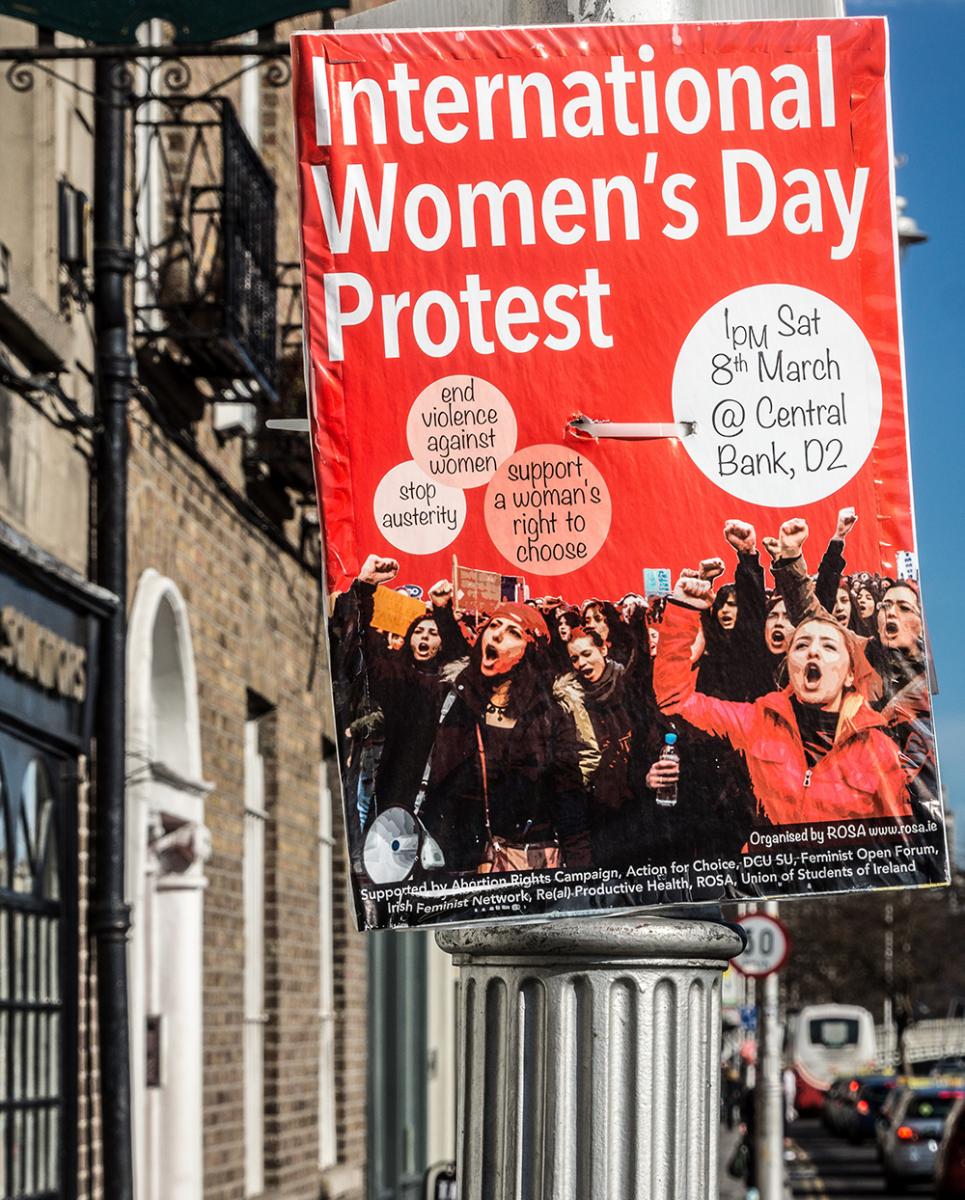 |
| Protests for women's rights were held all over the planet on International Women's Day. This sign is from Dublin, Ireland. |
The obstacles women face in achieving equality and claiming their rights are manifold, with the structural injustices built into fiscal policies one of the most insidious. In a groundbreaking show of international coordination and solidarity, women’s rights and tax justice activists all around the globe have taken a stand to demand that tax policies be designed to advance, rather than undermine, gender equality and women’s human rights.
Over the past fortnight since International Women’s Day, CESR has been engaging actively in the Global Days of Action on Tax Justice for Women’s Rights, a wide-ranging international campaign organized by the Global Alliance for Tax Justice, CESR and other partners in the women’s rights, development, tax justice and trade union movements.
The Global Days of Action, which saw events and rallies in all corners of the globe, were timed to coincide with this year’s meeting of the United Nations Commission on the Status of Women (CSW). With the rise of populist politics around the world fuelling new threats to women’s rights and equality, this year’s CSW – which took the theme of ‘Women’s Economic Empowerment in the Changing World of Work’ – had a special significance. Together with its partners, CESR took part in a series advocacy and campaign events staged in the sidelines of the CSW at the UN headquarters in New York.
Speaking at a side event hosted by the government of Ecuador, CESR’s Niko Lusiani made the case that financial secrecy jurisdictions are implicitly posing barriers to women’s human rights around the world. He explained how the siphoning of resources that might otherwise be used to expand and improve public services, together with disproportionate taxes on consumption and labor, take a disproportionate toll on women from low-income and disadvantaged groups in particular.
“The broken international tax system, and the financial secrecy jursdictions which sustain it, represent an important structural barrier for governments to raise revenue in a manner which respects gender equality,” he explained. Niko, who directs CESR’s Human Rights in Economic Policy program, also warned that the new corporate tax plans being debated in the United States threaten to provoke a dramatic race to the bottom in international tax competition, with potentially devastating consequences for women within and outside the country. Instead of this low-road of unilateral tax battles, Niko argued for a resurgence of true tax multilateralism, founded on the norms of international cooperation, and embodied in an inclusive UN inter-governmental tax body mandated to redesign the international tax regime.
The gender biases built into fiscal policy were teased out in further detail at a special Tax Justice for Women’s Rights Forum on March 16. Among the women’s rights and development experts speaking at the event was CESR’s Kate Donald, who explained the potential of international human rights oversight mechanisms to provide a much-needed avenue of accountability for the gendered impacts of unjust taxation. Drawing on our pioneering work to hold financial secrecy jurisdictions like Switzerland and the United Kingdom to account, Kate, who heads up our Human Rights in Sustainable Development program, showed how the cross-border tax abuse these jurisdictions facilitate has a profoundly pernicious impact on women’s rights and equality, and on sustainable development more broadly.
“The people who benefit most from tax abuses and illicit financial flows are rich men, while the people who bear the brunt of these abuses are poor women,” she said. “There are accountability avenues, and human rights provide us with a language and a range of spaces to challenge these policies and practices. It’s really crucial to subject these tax policies, and macroeconomic policies more broadly, to humans rights scrutiny.”
Full gender equality cannot ultimately be achieved without meaningful reform of the international tax regime and the persistent disparities it engenders. Working together with our allies in the women’s rights, development and tax justice fields, CESR will continue to push the envelope in confronting what remains one of the world’s most pervasive, yet least addressed, causes of inequality and injustice: insufficient and inequitable taxation.
Related:
- Human Rights in Sustainable Development
- Human Rights in Tax Policy
- Switzerland Factsheet
- UN Submission: Swiss Responsibility for the Extraterritorial Impacts of Tax Abuse on Women’s Rights
- UN Submission: UK Responsibility for the Impacts of Crossborder Tax Abuse on Economic, Social and Cultural Rights
- Briefing: Redistributing Unpaid Care Work: Why tax matters for women’s rights
- Niko Lusiani's comments from March 15 CSW side event.